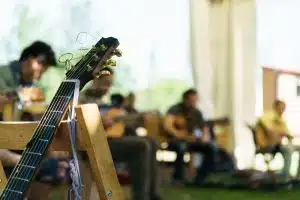Online Summer Programs at Berklee
Are you eager to elevate your musical talents and immerse yourself in a world-class educational experience? Berklee College of Music presents an exciting pathway for aspiring musicians like you through its Online Summer Programs!
This blog serves as your comprehensive navigator, shedding light on every aspect of these dynamic programs. From detailed insights into the curriculum to expert advice on the application process, we’ve got all your questions covered. Get ready to discover why Berklee stands out as the ideal destination for nurturing your musical prowess and shaping your artistic future.
What are the Online Summer Programs at Berklee?
The Online Summer Programs at Berklee College of Music offer a unique opportunity for students to advance their undergraduate studies and earn college credits in areas they are truly passionate about.
Spanning twelve weeks, these online programs are meticulously designed and led by a team of industry experts and esteemed educators who also teach at Berklee’s Boston campus. This initiative reflects the college’s commitment to providing high-quality music education, blending rigorous academic standards with the flexibility of online learning.
Students enrolled in these programs have the chance to delve deep into their chosen subjects, guided by the same professionals who have made Berklee a globally recognized name in music education.
Courses Offered
Harmony and Ear Training
Develop mastery in music theory, understand harmony and ear training, and learn the technical aspects of contemporary music.
Music Theory 101
If you’re eager to delve into music theory, understanding key concepts like pitch, rhythm, scales, intervals, chords, and harmony is crucial. Music Theory 101 offers a 12-week course filled with interactive and immersive lessons on these fundamental topics. This course is instrumental in helping numerous students grasp music theory and build a robust foundation in musical knowledge.
Through this online course, you’ll engage in lively class discussions, use interactive tools, and receive personalized feedback, all aimed at helping you apply music theory in practical situations. It’s a hands-on course designed for beginners, where you’ll not only learn about music theory but also practice reading, writing, and truly understanding music in a way you haven’t experienced before.
Getting Inside Harmony 1
If you’ve been involved in music for a while and know how to play an instrument but are looking to expand your skills, “Getting Inside Harmony 1” is the perfect next step. This course is designed to deepen your understanding of harmony. It’s about learning to identify and creatively use chord progressions in your playing and songwriting.
The course employs a mix of techniques — listening exercises, analytical thinking, visualization, vocal exercises, writing, and playing — to enhance your understanding of harmony across various contemporary music styles.
As you progress through the course, you’ll find that you can pick up new songs more quickly, easily transpose them, and make smarter choices about chord scales for arranging and improvisation.
Understanding the patterns and mechanics of chord progressions is invaluable for musicians, whether you’re an improviser, composer, or arranger. It’s especially helpful for gaining a deeper insight into a wide range of contemporary music styles, from standard tunes and popular music to jazz.
Time and Rhythm 1
This is a course focused on improving your understanding and execution of timing and rhythm in music. It aims to strengthen your internal sense of rhythm, teach you how to analyze rhythmic patterns in music by ear, and provide a solid foundation in reading and writing rhythmic notation.
The first part of the course emphasizes developing a natural sense of rhythm without relying on traditional music notation. You’ll engage in weekly activities that involve movement, vocal exercises, and body percussion to help internalize the rhythm. These practices are designed to enhance your rhythmic precision, which is crucial for confident performance in both solo and group settings.
In the latter half of the course, you’ll delve into standard rhythmic notation, starting from the basics and advancing to more complex rhythms in various meters. This progression builds on the skills you developed earlier in the course, preparing you for more challenging rhythmic concepts.
Throughout the semester, a mix of performance, listening, and dictation exercises will be used to integrate and refine your skills. Performance exercises aim to boost your confidence and awareness when playing music. Listening exercises will sharpen your ability to understand and engage with complex musical rhythms, both as a listener and a performer. Dictation exercises are designed to help you identify and categorize different rhythmic patterns.
Composition and Scoring
Acquire hands-on skills in composing, arranging, and orchestrating impactful music for visual media, guided by the expert-level education provided by Berklee’s experienced faculty.
Film Scoring 101
Film Scoring 101 is a course designed to provide a solid foundation in the field of film and media music composition, a sector that is flourishing today, especially with the rapid expansion of the streaming industry. This growth has led to an unprecedented demand for skilled media composers.
This course aims to transition you from a general composer to a specialized media composer, offering insights into the unique aspects of composing for film and other media. It serves as a crucial link between the worlds of film and music, making this intricate art form more accessible and understandable.
You’ll start with an overview of today’s media industry, learning about the technical and aesthetic challenges that composers face in this competitive field. The course will equip you with the skills to analyze and identify film scores and improve your storytelling abilities through various writing exercises.
Liberal Arts
The comprehensive knowledge and versatile skills gained from these courses will contribute to your overall personal growth and development, enhanced by the high-quality education provided by Berklee’s skilled and experienced faculty.
Developing Your Artistry
This course delves into the multifaceted role of artists in today’s world. Artists are often seen as individuals who capture and interpret the complexities of life, expressing a range of human emotions and experiences.
However, beyond this creative aspect, artists also face the practical challenge of making a living. This course will help you understand how to balance the creative and practical sides of being an artist.
The course covers both the philosophical and practical aspects of what it means to be an artist. It looks at how the concept of artistry has evolved over time and discusses topics such as making creativity a habit, understanding the aesthetics of your work, maintaining your health in relation to your artistic endeavors, and how to plan and sustain a career in the arts. A significant part of the course involves developing your own artistic identity and career plan in the music industry.
Featuring interviews and profiles of various artists like Victor Wooten, Nona Hendryx, Henry Diltz, and Tibetan monk Lama Sonam, the course offers diverse insights into the world of artistry.
History of Film Music
This is a foundational course for anyone interested or involved in film scoring. It provides an essential introduction to the roles and evolution of film composers, from the late 1800s with the advent of silent films to the diverse styles of the present day. This course offers a comprehensive look at the major stylistic trends and musical influences that have shaped film scoring into an important and dynamic form of dramatic art.
The course emphasizes that films and their music are reflections of their times and places. To fully grasp film music, it’s important to understand the historical contexts that shaped it, including the use of clichés, archetypes, and other techniques film composers use to enhance storytelling. This understanding will deepen your appreciation of film music, revealing the deliberate choices behind every musical element you hear.
Throughout the course, we’ll explore the work and impact of notable composers who have contributed to various musical styles in film, from romantic and operatic orchestral traditions to popular genres like jazz, rock, and modern song scores. You will also dive into contemporary trends like electronic and synthesized music, as well as the impact of global musical influences.
Weekly lessons include an introduction to specific themes or topics, providing a broader historical perspective and in-depth analysis. These lessons cover a range of supporting materials, including film and audio clips, as well as examples of thematic and harmonic scoring. You’ll engage in both self-guided study and guided learning under the direction of your instructor.
The Language of Film and TV
This is an essential course for composers and musicians planning to work in the film and TV industries. It’s designed to teach you how to effectively communicate with directors, producers, and others in these fields. The course focuses on how film and television create meaning beyond just the story and characters.
You will learn about the evolution of film and TV, including the various techniques and elements used to engage audiences. These include camera work, frame composition, lighting, production design, acting styles, editing, dialogue, plot, genre, themes, sound, and point of view.
The course also covers important aspects of filmmaking like mise-en-scène, cinematography, and editing, giving you a well-rounded understanding of the visual components of film and TV.
The course begins with a historical overview, exploring early cinema contributions from figures like Edison, the Lumière brothers, and Méliès, and progresses through the silent era to the introduction of sound and the development of the studio system. You will also explore the rise of television and its integration into daily life.
Additionally, the course includes studies on documentary, experimental, and animated films, and discusses how digital technology is reshaping these mediums. You will watch and analyze various films, such as “The Great Train Robbery,” “It,” “The Crowd,” “Bringing Up Baby,” and others, as well as select films from the American Film Institute’s 100 Years 100 Movies list. The course also includes analysis of TV series, including classics like “I Love Lucy” and current shows.
Music, Self, and Society
This course is geared towards equipping you with a deep understanding of film and TV language, enhancing your ability to work and collaborate effectively in these dynamic industries. This is a thought-provoking course that delves into the reasons behind our engagement with music. It explores the functions of music in our lives, the nature of our musical preferences, the concept of “good” music, and the role of music in shaping communities and driving social change.
Throughout this course, you’ll develop a deeper awareness of how we, both as individuals and as part of larger communities, interact with music in ways we often don’t realize. You’ll also gain insight into the subtle yet powerful ways music influences our society and impacts our collective and individual mindsets.
The course combines readings from various fields, including music criticism, sociology, psychology, philosophy, and more. Each session tackles a broad topic, like musical taste, from diverse perspectives, offering a comprehensive understanding of the subject.
We’ll explore a wide range of musical genres, from catchy advertising jingles to jazz, pop, classical, and world music. The chosen music exemplifies the issues discussed, sometimes providing answers, and other times raising new questions.
For instance, when discussing music and social change, we’ll look at iconic songs such as “We Shall Overcome” and “Strange Fruit,” as well as contemporary acts like Pussy Riot. TV and film clips will also be used to highlight specific points.
Music Business
Enhance your understanding of the essential concepts, skills, and methods required for success in the modern music industry, guided by the expert-level education from Berklee’s experienced and accomplished faculty.
Music Business 101
This is a comprehensive course that delves into the intricacies of the multi-billion-dollar global music industry. This industry is not just about the artists and musicians who create music but also encompasses a vast network of professionals working behind the scenes.
These include roles in record labels, distribution and publishing companies, recording studios, artist management, marketing, production, and legal services. For those aspiring to a career on the business side of music, understanding the industry’s full scope is crucial for success.
The course offers a detailed overview of the music industry, explaining how different sectors function daily. It covers where the money comes from, who the major players are, the ins and outs of deal-making, and how to safeguard your interests. A key focus is on the impact of digital technology, which is revolutionizing how music is marketed, promoted, distributed, and consumed.
“Music Business 101” highlights various career opportunities within the industry and equips you with the necessary knowledge to reach your career goals.
Music Production
Enhance your critical listening abilities and learn about both the creative and technical aspects of creating a professional-quality mix, all through the expert-level instruction provided by Berklee’s experienced and skilled faculty.
Music Production Analysis
This offers a deep dive into the art and science of producing great records, drawing on insights from experienced record producers including course author Stephen Webber and others like Phil Ramone and Don Was.
The course emphasizes that while genres, messages, and lyrics may vary, the core principles of creating an outstanding record remain constant. This course aims to enhance your listening skills and show you how seasoned producers perceive music differently from those who are still learning the craft.
The course starts by analyzing the emotional impact of music, an essential aspect of any production. You’ll learn arrangement strategies that encourage musicians to contribute meaningfully to the recording, rather than just playing their parts. The course also distinguishes between producing and engineering a mix, guiding you on how to approach mixing to maximize the potential of your work.
Pro Tools 101
This is your first step towards becoming a proficient Pro Tools Operator, guided by the expertise of Berklee’s music production faculty. This course is the initial phase of the Avid Pro Tools certification program and is designed to teach you the fundamental skills necessary for completing a Pro Tools project. From setting up your initial project to the final mixdown, this course covers it all.
Regardless of the nature of your project – whether it involves recording live instruments, sequencing MIDI with software synthesizers, or working with audio loops – “Pro Tools 101” offers practical examples and hands-on assignments. These are crafted to teach you the basics of recording, editing, and mixing.
By the end of the course, you’ll have the chance to take the Avid Pro Tools 101 Exam online, marking a significant step in your Pro Tools certification journey.
Critical Listening 1
This is designed for recording musicians, budding producers, and engineers who want to refine their understanding of the mixing process and develop the skill of discerning the qualities of a professional mix. The course emphasizes that even the best songs played by skilled musicians can suffer from a poor mix, which can make the music sound unprofessional.
This course will enhance your ability to critically assess various aspects of a mix through regular listening exercises, analysis of classic recordings, and comparisons of different mixing styles across musical genres.
You’ll learn to recognize elements like spatial width and depth, frequency range, dynamics, and how mixing styles vary between genres. The course covers technical aspects such as panning, different types of reverb, delay, compression, effects like phasing, flanging, chorus, and various forms of distortion.
This course dives into the nuances of different instruments and arrangements. You’ll learn to differentiate between guitar types like Telecasters, Strats, and Les Pauls, understand single versus dual-coil pickups, and compare direct and miked acoustic and electric guitars, among other things. The course will also guide you in transforming your listening space into a more conducive environment for critical listening.
Producing Music with Logic
This course is a comprehensive course designed to help you master Apple’s Logic Pro X, one of the leading music production platforms. The course focuses on building both your technical skills in using Logic Pro X and your creative music production abilities.
The course starts with an introduction to the Logic music software, covering its interface, including different windows and editors, navigation, key commands, screen sets, and overall workflow. You’ll then progress to learning about MIDI editing and control, as well as techniques for recording and editing audio, and working with QuickTime video.
A significant part of the course is dedicated to exploring Logic’s vast array of software instruments, like the ES2, EXS-24, Sculpture, UltraBeat, and other synthesizers and vintage instruments. You’ll delve into production design elements, including composition, song form, and using Logic’s arrangement tools to craft and shape a song.
Further, the course covers mixing tools and advanced mixing techniques available in Logic Pro X. This includes setting up instruments with multiple outputs, side-chaining, and mix automation. You’ll engage in critical listening, interactive activities, and learn expert tips and tricks, showcasing the wide-ranging capabilities of Logic Pro X.
Performance
Explore and refine your instrumental or vocal skills while embracing a wide array of musical genres.
Blues Guitar
This is a course designed for guitarists who want to build a strong musical foundation by learning the blues. Having a background in blues guitar gives a player a significant edge, regardless of the genre they choose to play, be it jazz, rock, or classical. This is because blues provides a fundamental understanding of form, control, feel, and harmonies, which are beneficial in any music style.
The course starts with the basics of 12-bar blues harmony and fundamental rhythm guitar techniques. You’ll also learn the pentatonic and blues scales, starting from the open position and moving up the neck.
The course focuses on integrating the distinctive nuances of legendary blues guitarists into your playing. This includes techniques like doubling the bass in a shuffle, à la Buddy Guy, and blending major and minor pentatonic scales in the style of B.B. King and T-Bone Walker.
You’ll engage in call-and-response exercises and explore playing in different grooves and tempos. One key skill you’ll develop is how to pace your blues guitar solos, a technique used by the greatest guitarists to create a sense of tension and release. This course will also guide you in applying these concepts to enhance your musicality, whether in adopting a blues sound or adding depth to other styles.
This course is perfect for guitarists looking to deepen their blues playing skills or those wanting to enrich their playing style with the depth and feel of blues guitar.
Guitar for Beginners
This is an all-encompassing course designed to introduce you to playing the guitar and lay the groundwork for diverse styles of guitar playing. This course is tailored to accommodate beginners of all ages and backgrounds, whether you’ve just started playing or come from a self-taught or lesson-based background and are looking to solidify your skills.
The teaching approach in “Guitar for Beginners” is multifaceted, incorporating video demonstrations, recorded music, practice tracks, various music notations, chord diagrams, and exercises.
Each lesson includes listening examples and interviews from a wide range of guitar styles. The Berklee guitar program values a foundation in musicianship and instrumental skills, respect for all styles of music, and personal creative expression. This course is designed to be a lasting guide through years of guitar practice as you build a strong foundation.
This is an ideal starting point for anyone aspiring to learn the guitar, providing the essential skills and knowledge to develop and express your musical voice on the instrument.
Popular Singing Styles: Developing Your Sound
This course is crafted for vocalists who are ready to step up and establish their unique presence in the music world. If you’ve been honing your vocal skills and are inspired by great singers, this course is about taking that inspiration and transforming it into something distinctly yours. It’s about finding your unique voice, message, and style that sets you apart.
In this course, through both structured learning and personal exploration, you will discover your musical identity. You’ll learn to fine-tune your vocal tone and style, finding the right keys that complement your voice.
The course covers in-depth vocal techniques such as breath control, vocal placement, belting, soft singing, and more, all aimed at enhancing your natural voice. You’ll gain a deeper understanding of how your voice works anatomically, especially in different vocal registers, giving you greater control and artistic flexibility in your singing.
The curriculum includes practical exercises and singing sessions. You will analyze songs to understand what makes them resonate with listeners, experiment with various accompaniments, and learn to shape your vocal delivery to highlight the best elements of your style. The course also demystifies the concept of the ‘mix voice’, a vital tool for vocalists. You’ll explore a range of genres like rock, pop, R&B, and jazz to find your place in the spectrum of popular music.
Additionally, you’ll learn how to work effectively with a live rhythm section and lead rehearsals confidently.
Voice Technique 101
This is an entry-level course perfect for anyone looking to enhance their vocal abilities. It’s designed to help you strengthen your voice, broaden your vocal range and expression, and boost your confidence during performances. This course is particularly suitable for beginners and serves as a great introduction to online voice training.
The course uses a range of teaching methods, including video demonstrations, animated illustrations, and numerous recorded examples. You’ll learn how to sing with greater ease, control your breathing more effectively, and understand the essentials of vocal health.
The course includes specially designed melody preparation tracks to help you develop independence in your singing, along with sing-along tracks accompanied by a rhythm section.
Throughout the course, you’ll be introduced to practical warm-up and practice routines. You’ll also learn techniques to manage performance anxiety, stage movement, and microphone use. As the course progresses, you’ll find yourself able to sing in various styles more skillfully and with greater awareness.
Songwriting
Enhance your ability to craft song structures, harmonies, melodies, and lyrics using techniques that have led Berklee alumni to achieve number one hits and Grammy Awards, all under the guidance of Berklee’s expert and accomplished faculty.
Music Production Fundamentals for Songwriters
This is a course tailored for modern songwriters who want to harness the power of technology in their songwriting process. As a songwriter in the twenty-first century, you have the opportunity to go beyond traditional instruments and use your computer as a powerful tool for composing and producing music.
This course is ideal whether you’re new to using technology for music creation or have some experience with a Digital Audio Workstation (DAW). The main objective is to empower you to take control of your music and content creation. You’ll learn about DAWs, MIDI technology, and various contemporary recording techniques that will enhance the sound of your songs. The course aims to complement your songwriting skills with the technical knowledge needed to engineer and produce your own music.
Throughout the course, you’ll gain skills that will not only boost your individual music production capabilities but also enhance your ability to collaborate effectively with engineers, producers, and other musicians. A key requirement of the course is songwriting, where you’ll need to create songs that combine lyrics and melody, intended to be sung by a vocalist.
Lyric Writing: Tools and Strategies
This is a course designed to enhance your skills in crafting song lyrics. This course provides you with the techniques that have aided Pat Pattison’s students, many of whom have achieved Grammy awards and written chart-topping songs. The course focuses on improving your ability to come up with creative ideas, choose the right words to convey these ideas, and effectively structure them into engaging verses, choruses, and bridges.
Songwriting: Writing Hit Songs
This course is aimed at helping you master the art of songwriting. Regardless of your current skill level – whether you’re a beginner or an experienced songwriter – this course offers valuable insights into the methods used by successful songwriters to create engaging and memorable songs.
This practical, hands-on course is designed to guide you in finding your individual voice as a songwriter, sharpening your songwriting abilities, and crafting songs that leave a lasting impression on your audience. Whether you’re just starting out or looking to enhance your songwriting, this course will provide you with the tools and inspiration to create impactful music.
Why should you join the Online Summer Programs at Berklee?
Enrolling in Berklee’s Online Summer Programs presents a multitude of benefits for aspiring musicians and music enthusiasts alike. First and foremost, participants gain access to the college’s celebrated faculty, renowned for their expertise and teaching at Berklee’s physical campus. This ensures that students receive the same level of instruction and mentorship online as they would in person.
The programs are designed with flexibility in mind, accommodating both part-time and full-time study preferences. This adaptable format allows students to balance their music education with other commitments seamlessly. Additionally, these programs hold full accreditation from the New England Commission of Higher Education (NECHE), assuring the quality and recognition of the education provided.
Another significant advantage is the transferability of credits earned. Students can transfer these credits to numerous other colleges and universities, making Berklee’s Online Summer Programs a valuable stepping stone in their academic and musical journeys.
Furthermore, the online platform fosters a vibrant community of musicians from over 140 countries. This global network not only enhances the learning experience but also provides a rich cultural exchange and networking opportunities within the international music scene.
How do you get into the Online Summer Programs at Berklee?
Gaining admission to the Online Summer Programs at Berklee varies depending on the specific course you are interested in. Each course has its own set of prerequisites and entry requirements, which are clearly outlined on the course description and requirements page. These prerequisites are designed to ensure that all students are adequately prepared for the course content and have the best chance of success.
The programs are open to students aged 14 and above, making them accessible to a wide range of learners, from high school students to adults looking to further their music education.
One of the key advantages of these programs is the streamlined admission process: there is no formal application necessary to enroll in most courses. This ease of access allows students to quickly and easily begin their musical journey with Berklee, focusing more on learning and less on administrative procedures.
How do I apply to the Online Summer Programs at Berklee?
Applying for the Online Summer Programs at Berklee is a straightforward and hassle-free process, as there is no formal application required. To begin, simply visit the Berklee Online Summer Programs website. Here, you can browse through the various programs available and select the ones that align with your musical goals and interests. Once you’ve made your selection, the next step is to click on the ‘enroll’ button to start your enrollment process.
For undergraduate students considering their course load, it’s important to understand the distinction between part-time and full-time study. To be classified as a part-time student, you need to enroll in 2 courses, which equates to 6 credits in a semester. On the other hand, if you’re aiming for full-time status, you should enroll in 4 courses, totaling 12 credits in a semester.
Carefully consider the amount of time you can realistically dedicate to your studies before enrolling in multiple courses within a single semester. Balancing coursework with other commitments is key to ensuring a successful and manageable academic experience.
Undergraduate students who wish to take more than four courses in a single semester will need to seek approval from the Berklee Online Registrar’s Office. This step is important to ensure that students can handle the additional workload and maintain the quality of their academic performance.
By keeping these guidelines in mind, students can effectively plan their study schedules and make the most out of Berklee’s Online Summer Programs, tailored to their individual needs and time constraints.
How hard is getting into the Online Summer Programs at Berklee?
Gaining entry into the Online Summer Programs at Berklee is primarily influenced by the class size limit. Each section of the program is capped at a maximum of 20 students. This means that admission into these courses depends on the availability of spots within each class.
With limited spaces, it’s important for interested students to enroll as early as possible to secure their place in the program. The small class size ensures a more personalized and focused learning environment but also means that spaces can fill up quickly.
When is the deadline to apply to the Online Summer Programs at Berklee?
The deadline for applying to Berklee’s Online Summer Programs for the year 2024 is set for May 31st. This is the final date by which you must complete your enrollment for these programs.
If you are already enrolled and need to make any changes to your course selections, you have until June 7th to do so. It’s important to keep these dates in mind to ensure that you have enough time to finalize your enrollment and make any necessary adjustments to your summer program courses.
Enrollment in classes is based on the order in which payments are received, following a first-come, first-served basis.
Where are the Online Summer Programs at Berklee held?
The Online Summer Programs at Berklee are conducted entirely in a virtual format, requiring consistent and timely participation from students online. To successfully complete any course in Berklee Online, students must engage regularly and promptly with the course materials and assignments.
Since the lessons each week build upon each other, students must stay up to date with their coursework and assignments to fully grasp the cumulative nature of the curriculum.
Collaboration and communication with fellow students are key components of the Berklee Online educational experience. Students who lag in their coursework risk missing out not only on the academic content but also on the valuable community aspect of the courses.
Every week, instructors post new lessons, and students have the flexibility to log on and work on these materials at any time during that week. On average, students should expect to spend about 7-10 hours per week on the lessons and assignments, although this can vary depending on individual experience levels.
Students should start their courses right at the beginning of the semester. If a student needs to start a few days late, they should inform their instructor via private message or email as soon as possible after the course commences.
In cases where students know they will be unavailable for a period, they should notify their instructors in advance through private messages or email. They should try to continue working on their courses during their absence or plan with their instructors on how to catch up upon return.
Each instructor has their own policy regarding late submissions, and it’s important for students to understand these policies and communicate with their instructors about any delays or issues. Instructors may assign a failing grade if required work in a course is not submitted, and a grade of “F” can be recorded for failure to complete or properly withdraw from courses.
When do the Online Summer Programs at Berklee take place?
The 2024 Online Summer Programs at Berklee are scheduled to start on May 28th and will run until August 18th. This period marks the duration of the programs for that year, encompassing several weeks of intensive online learning and engagement.
The instructors for these courses are comprised of Berklee faculty members who are highly recognized and respected experts in their respective fields. To accommodate more sections and offer a broader range of expertise, additional instructors, who may not be listed on our website, are sometimes included.
These additional instructors are either Berklee faculty or seasoned professionals actively working in the industry. This ensures that all course participants receive top-quality instruction from experienced and knowledgeable professionals.
How long is the duration of the Online Summer Programs at Berklee?
The Online Summer Programs at Berklee span a period of 12 weeks, providing an extensive and immersive learning experience over this duration.
Many courses offered by Berklee Online are eligible for credit transfer towards an undergraduate degree at Berklee College of Music. Berklee College of Music holds accreditation from the New England Commission of Higher Education (NECHE).
If you’re considering transferring Berklee Online credits to another college or university, it’s important to consult with that institution, as the acceptance of transfer credits is determined by the receiving institution.
After completing an individual Berklee Online course, you will receive a letter of completion. This letter will be accessible on your homepage for approximately 6-8 weeks following the end of the semester. Additionally, if you complete a course for credit, the grade you earn will be recorded on your permanent Berklee Online transcript.
Choosing College Programs After Berklee’s Online Summer Courses: Advice for Further Education and Degrees
After completing the Online Summer Programs at Berklee, students who are enthusiastic about pursuing further education in music have a variety of undergraduate degree options to consider. Berklee’s Online Summer Programs, which cover a range of topics from music theory, to production, songwriting, and performance, set a solid foundation for more advanced studies in these fields.
Here are some potential undergraduate degree programs that students might explore after their summer experience:
Bachelor of Music in Performance: The Bachelor of Music in Performance is an excellent choice for students who have engaged in performance-related summer courses at Berklee. This degree program is meticulously designed to focus on honing instrumental or vocal talents, enhancing stage presence, and fostering a comprehensive understanding of various musical genres.
Students are given the opportunity to delve deeply into the technical aspects of their chosen instrument or voice, guided by experienced instructors. The curriculum includes intensive training in performance techniques, helping students to refine their skills and expressiveness.
Bachelor of Music in Music Production: The Bachelor of Music in Music Production is an excellent path for students who have taken courses such as Music Production Analysis or Pro Tools 101. This degree program dives into the intricacies of music production, offering a deeper exploration of recording technology, mixing, mastering, and a variety of music production techniques.
In this program, students will be immersed in advanced studies of audio technology and production processes. They will learn about the latest in digital and analog recording equipment, software, and industry-standard production tools. The curriculum is designed to provide hands-on experience in various recording environments, from home studios to professional studio settings.
Bachelor of Music in Songwriting: The Bachelor of Music in Songwriting is a perfect choice for students who discovered their love for crafting songs in courses such as Songwriting: Writing Hit Songs or Lyric Writing: Tools and Strategies. This degree program is centered around the art of song composition, lyric writing, and nurturing a distinct artistic voice.
Students delve into the creative process of songwriting, exploring various techniques to compose music and pen meaningful lyrics. They are encouraged to experiment with different musical styles and genres, fostering versatility in their songwriting skills. The coursework is designed to help students develop their unique style and voice as songwriters, ensuring their work stands out in the music industry.
Bachelor of Music in Music Business/Management: This program is an ideal progression for students who have a keen interest in the administrative and commercial aspects of the music industry, as introduced in courses like Music Business 101. This program provides an in-depth exploration of the business side of music, encompassing key areas such as marketing, management, and music law.
Students delve into the complexities of managing music careers, artist promotion, and the intricacies of the music market. They learn about various marketing strategies and how to effectively promote artists and their music in an ever-evolving digital landscape. The program also covers fundamental aspects of managing music events, tours, and other live performances.
Bachelor of Music in Music Education: This is an ideal choice for students who have a passion for teaching music and want to inspire the next generation of musicians. This degree program is tailored to prepare students for careers as music educators, equipping them with the necessary skills and knowledge to excel in this field.
Students who have participated in music education-related summer courses will find this program particularly beneficial. It provides a comprehensive understanding of pedagogical methods, curriculum development, and educational psychology, all while maintaining a strong focus on musical training.
Bachelor of Music in Film Scoring: This is an excellent choice for students who have a passion for composing music for visual media, such as film, television, and video games. This degree program is designed to provide students with the comprehensive skills and knowledge needed to excel in the field of film scoring.
For those who have shown interest in courses like Film Scoring 101 during their summer programs, this degree program takes their passion to the next level. Students will delve deep into the art of composing music that enhances the emotional impact of visual media. They will learn how to synchronize music with on-screen action, create memorable themes, and use various compositional techniques to craft compelling soundtracks.
Bachelor of Music in Music Therapy: This is a distinctive degree program tailored to individuals who are deeply passionate about harnessing the power of music for healing and therapy. This specialized program provides students with a comprehensive education that combines musical proficiency, psychology, and therapeutic methodologies.
For students who have a keen interest in the healing aspects of music, particularly those who have explored courses related to therapy during their summer programs, this degree is the perfect opportunity to delve deeper into this field. The curriculum is thoughtfully designed to equip students with the knowledge and skills needed to make a meaningful impact through music.
Bachelor of Science in Music Production: The Bachelor of Science in Music Production is an ideal degree program for students who have previously engaged in production-centric summer courses and are looking to dive deeper into the world of music production. This program is specifically tailored to focus on the technicalities and nuances of recording, editing, and producing music in a studio environment.
In this program, students will gain a comprehensive understanding of the various aspects of music production. This includes advanced recording techniques, the use of digital audio workstations, sound engineering principles, mixing, and mastering. Students will be exposed to the latest technology and software used in the industry, ensuring they are up to date with current production standards and practices.
Each of these degree programs offers a unique path for students to continue their musical journey, building on the knowledge and skills acquired during the Berklee Online Summer Programs. Students should consider their personal interests, strengths, and career aspirations when choosing the right degree program to pursue after their pre-college experience.
Final Thoughts
Berklee’s Online Summer Programs are your stepping stone to achieving great things in music. They offer top-notch teaching, real-world experience, and the chance to connect with musicians from all over the world.
As you begin this journey, remember that your hard work, love for music, and creativity are what will really help you succeed and explore new possibilities in music. Take this opportunity and let Berklee guide you on an exciting path that matches your musical ambitions. This is where you can truly grow as a musician and make your dreams a reality.
Looking for help with pre-college program admissions? Consider partnering with college admissions experts such as AdmissionSight. Our extensive experience has helped many students gain admission to prestigious universities worldwide. Begin your academic journey today – schedule a consultation with us!





















































